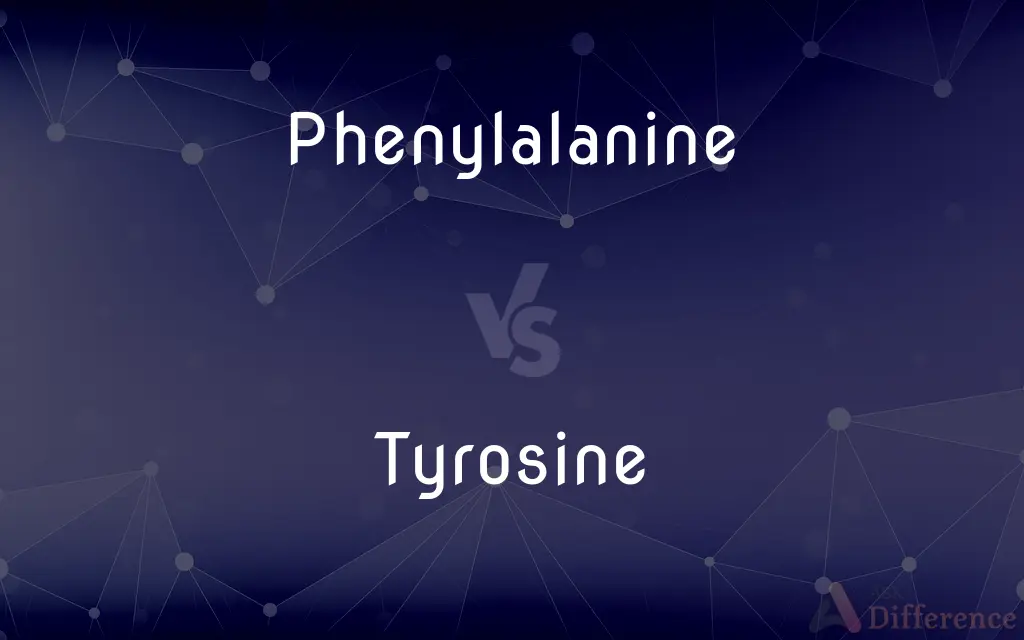Phenylalanine vs. Tyrosine — What's the Difference?
Edited by Tayyaba Rehman — By Fiza Rafique — Updated on April 2, 2024
Phenylalanine is a precursor to Tyrosine, essential for protein synthesis; Tyrosine is crucial for neurotransmitter production.

Difference Between Phenylalanine and Tyrosine
Table of Contents
ADVERTISEMENT
Key Differences
Phenylalanine is an essential amino acid, meaning the body cannot produce it, and it must be obtained through diet. It plays a key role in the biosynthesis of other amino acids and neurotransmitters. Whereas, Tyrosine is a non-essential amino acid produced from Phenylalanine in the body. It is vital for the production of neurotransmitters such as dopamine, epinephrine, and norepinephrine.
Phenylalanine's role in the body primarily revolves around its necessity for the synthesis of proteins and other vital molecules. On the other hand, Tyrosine's significance extends to its contribution to mental alertness and the function of the adrenal, thyroid, and pituitary glands.
One notable difference is in their nutritional sources. Phenylalanine is found in high-protein foods like meat, fish, eggs, and dairy products, while Tyrosine, although also present in these foods, can be synthesized by the body from Phenylalanine, offering an additional source.
Metabolically, Phenylalanine is the precursor to Tyrosine, meaning it must first be converted into Tyrosine before it can be utilized for the synthesis of important neurotransmitters. In contrast, Tyrosine can be directly used by the body to produce these molecules, streamlining its role in neurotransmission.
In terms of health implications, an imbalance of Phenylalanine can lead to health issues like phenylketonuria (PKU), where the body can't process Phenylalanine, leading to harmful levels. Conversely, Tyrosine supplementation is researched for its potential to improve mood and cognitive function, showcasing its therapeutic benefits.
ADVERTISEMENT
Comparison Chart
Category
Essential amino acid
Non-essential amino acid (conditionally essential)
Role in Body
Precursor to Tyrosine, involved in protein synthesis
Produces neurotransmitters, contributes to mental alertness
Nutritional Source
High-protein foods: meat, fish, eggs, dairy
High-protein foods, can be synthesized from Phenylalanine
Metabolic Function
Must be obtained through diet, converted into Tyrosine and other molecules
Synthesized from Phenylalanine, directly used for neurotransmitter production
Health Implications
Excess can lead to phenylketonuria (PKU)
Supplementation can improve mood and cognitive function
Compare with Definitions
Phenylalanine
Essential Amino Acid.
Phenylalanine must be obtained from the diet as it is an essential amino acid crucial for health.
Tyrosine
Metabolic Role.
Tyrosine plays a role in the function of glands such as the thyroid, affecting metabolism.
Phenylalanine
Protein Synthesis.
Phenylalanine is integral to the body's ability to build and repair proteins.
Tyrosine
Supplementation Benefits.
Supplementing with Tyrosine may improve cognitive function under stress.
Phenylalanine
Dietary Requirement.
Individuals need to consume sufficient Phenylalanine through food to meet their dietary requirements.
Tyrosine
Non-Essential Amino Acid.
Tyrosine is a non-essential amino acid that the body can produce from Phenylalanine.
Phenylalanine
Precursor to Other Molecules.
In the body, Phenylalanine is converted into Tyrosine, used in the synthesis of neurotransmitters.
Tyrosine
Dietary Source and Synthesis.
While Tyrosine is found in protein-rich foods, the body can also synthesize it from Phenylalanine.
Phenylalanine
PKU Related.
Managing Phenylalanine intake is crucial for individuals with phenylketonuria (PKU) to prevent health complications.
Tyrosine
Neurotransmitter Production.
Tyrosine is vital for the synthesis of dopamine, a neurotransmitter important for mood and cognition.
Phenylalanine
Phenylalanine (symbol Phe or F) is an essential α-amino acid with the formula C9H11NO2. It can be viewed as a benzyl group substituted for the methyl group of alanine, or a phenyl group in place of a terminal hydrogen of alanine.
Tyrosine
L-Tyrosine or tyrosine (symbol Tyr or Y) or 4-hydroxyphenylalanine is one of the 20 standard amino acids that are used by cells to synthesize proteins. It is a non-essential amino acid with a polar side group.
Phenylalanine
An essential amino acid, C9H11NO2, that occurs as a constituent of many proteins and is converted to tyrosine in the body.
Tyrosine
A nonessential amino acid, C9H11NO3, that is produced in the body from phenylalanine and is a precursor of melanin and of several neurotransmitters and hormones, such as epinephrine and thyroxine.
Phenylalanine
(amino acid) An essential amino acid C9H11NO2 found in most animal proteins; it is essential for growth; the inability to metabolize it leads to phenylketonuria; it is a constituent of aspartame.
Tyrosine
(amino acid) A nonessential amino acid 2-amino-3-(4-hydroxyphenyl)propanoic acid found in most animal proteins, especially casein
Tyrosine
An amino acid found in most proteins; a precursor of several hormones
Common Curiosities
What are the dietary sources of Phenylalanine?
Meat, fish, eggs, and dairy products are rich in Phenylalanine.
What is Tyrosine?
A non-essential amino acid important for the production of neurotransmitters and derived from Phenylalanine.
Can Phenylalanine cause health problems?
Yes, in individuals with PKU, high levels of Phenylalanine are harmful.
Is Tyrosine supplementation beneficial?
Research suggests it may improve mood and cognitive function.
What role does Tyrosine play in the body?
It's crucial for neurotransmitter production and gland function.
How are Phenylalanine and Tyrosine related?
Phenylalanine is converted into Tyrosine in the body.
Why is Phenylalanine essential?
The body cannot synthesize it; thus, it must be ingested through diet.
Can Tyrosine be produced in the body?
Yes, the body can synthesize Tyrosine from Phenylalanine.
Can Tyrosine affect mental health?
Yes, it plays a role in the production of mood-regulating neurotransmitters.
How does the body convert Phenylalanine to Tyrosine?
Through a metabolic process involving enzymes, Phenylalanine is hydroxylated to form Tyrosine.
What is Phenylalanine?
An essential amino acid necessary for protein synthesis and precursor to Tyrosine.
Why is Tyrosine considered conditionally essential?
In certain conditions, like stress or illness, the body's requirement for Tyrosine may exceed its ability to synthesize it, making it conditionally essential.
Who needs to monitor Phenylalanine intake?
Individuals with PKU need to carefully regulate their intake.
What is the difference between essential and non-essential amino acids?
Essential amino acids cannot be synthesized by the body and must be obtained from the diet, while non-essential ones can be made internally.
What foods are high in Tyrosine?
Protein-rich foods and those containing Phenylalanine.
Share Your Discovery

Previous Comparison
Close vs. Muggy
Next Comparison
Barrel vs. TubAuthor Spotlight
Written by
Fiza RafiqueFiza Rafique is a skilled content writer at AskDifference.com, where she meticulously refines and enhances written pieces. Drawing from her vast editorial expertise, Fiza ensures clarity, accuracy, and precision in every article. Passionate about language, she continually seeks to elevate the quality of content for readers worldwide.
Edited by
Tayyaba RehmanTayyaba Rehman is a distinguished writer, currently serving as a primary contributor to askdifference.com. As a researcher in semantics and etymology, Tayyaba's passion for the complexity of languages and their distinctions has found a perfect home on the platform. Tayyaba delves into the intricacies of language, distinguishing between commonly confused words and phrases, thereby providing clarity for readers worldwide.















































